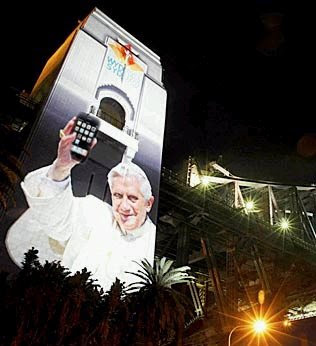This desire for communication and friendship is rooted in our very nature as human beings and cannot be adequately understood as a response to technical innovations. In the light of the biblical message, it should be seen primarily as a reflection of our participation in the communicative and unifying Love of God, who desires to make of all humanity one family. When we find ourselves drawn towards other people, when we want to know more about them and make ourselves known to them, we are responding to God’s call - a call that is imprinted in our nature as beings created in the image and likeness of God, the God of communication and communion.
The desire for connectedness and the instinct for communication that are so obvious in contemporary culture are best understood as modern manifestations of the basic and enduring propensity of humans to reach beyond themselves and to seek communion with others. In reality, when we open ourselves to others, we are fulfilling our deepest need and becoming more fully human. Loving is, in fact, what we are designed for by our Creator. Naturally, I am not talking about fleeting, shallow relationships, I am talking about the real love that is at the very heart of Jesus’ moral teaching: "You must love the Lord your God with all your heart, with all your soul, with all your mind, and with all your strength" and "You must love your neighbour as yourself" (cf. Mk 12:30-31)...
***
The new technologies have also opened the way for dialogue between people from different countries, cultures and religions. The new digital arena, the so-called cyberspace, allows them to encounter and to know each other’s traditions and values. Such encounters, if they are to be fruitful, require honest and appropriate forms of expression together with attentive and respectful listening. The dialogue must be rooted in a genuine and mutual searching for truth if it is to realize its potential to promote growth in understanding and tolerance. Life is not just a succession of events or experiences: it is a search for the true, the good and the beautiful. It is to this end that we make our choices; it is for this that we exercise our freedom; it is in this - in truth, in goodness, and in beauty - that we find happiness and joy. We must not allow ourselves to be deceived by those who see us merely as consumers in a market of undifferentiated possibilities, where choice itself becomes the good, novelty usurps beauty, and subjective experience displaces truth.
***
Dear Brothers and Sisters, I ask you to introduce into the culture of this new environment of communications and information technology the values on which you have built your lives. In the early life of the Church, the great Apostles and their disciples brought the Good News of Jesus to the Greek and Roman world. Just as, at that time, a fruitful evangelization required that careful attention be given to understanding the culture and customs of those pagan peoples so that the truth of the gospel would touch their hearts and minds, so also today, the proclamation of Christ in the world of new technologies requires a profound knowledge of this world if the technologies are to serve our mission adequately. It falls, in particular, to young people, who have an almost spontaneous affinity for the new means of communication, to take on the responsibility for the evangelization of this "digital continent". Be sure to announce the Gospel to your contemporaries with enthusiasm. You know their fears and their hopes, their aspirations and their disappointments: the greatest gift you can give to them is to share with them the "Good News" of a God who became man, who suffered, died and rose again to save all people. Human hearts are yearning for a world where love endures, where gifts are shared, where unity is built, where freedom finds meaning in truth, and where identity is found in respectful communion. Our faith can respond to these expectations: may you become its heralds!
Benedict XVI
May 24, 2009
Image sourced from this webpage.
